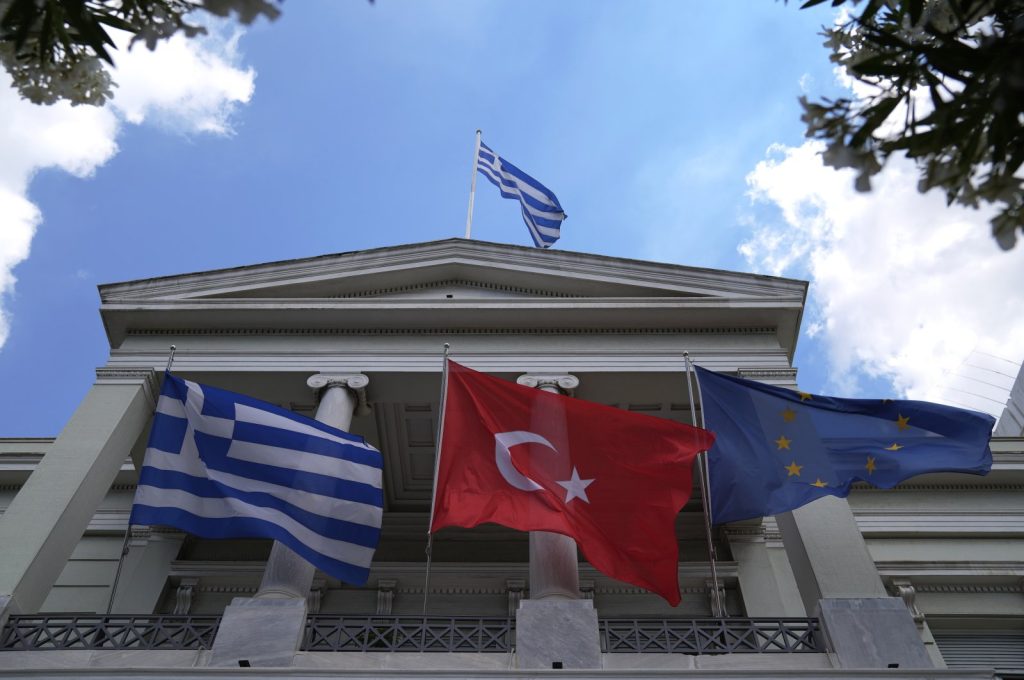The seventh round of Greek-Turkish discussions on Positive Agenda will kick off on Monday in Athens. Deputy Foreign Ministers Kostas Fragkogiannis and Mehmet Kemal Bozay will represent Greece and Türkiye, respectively, at the meeting. On Tuesday, Greek and Turkish diplomats will attend the third meeting of the Political Dialogue. The meetings aim to navigate two neighbors through a complex process of friendship after years of hostilities.
They will be followed by a High-Level Strategic Cooperation Council meeting scheduled in January or February during Greek Prime Minister Kyriakos Mitsotakis’ visit to Türkiye.
Last month, delegations from the defense ministries of Türkiye and Greece came together in Istanbul for a meeting entitled “Confidence-Building Measures 2024 Application Plan,” one day before Foreign Minister Hakan Fidan visited Athens.
After a long period of tensions marked by disputes over irregular migration, the Cyprus dispute, energy exploration and territorial sovereignty in the Aegean, Türkiye and Greece have been taking confidence-building steps for a fragile normalization of their relations, which moved into a new chapter with President Recep Tayyip Erdoğan’s landmark visit to Athens in December. During the visit, the sides announced a friendship declaration, visa facilitation for Turkish citizens for 10 Greek islands in the northern Aegean for up to seven days and the decreased flow of irregular migrants to Greece.
While officials on both sides have expressed commitment to maintaining the positive climate, the issues are longstanding and deep-rooted, and neither side expects the process to be without turbulence, particularly in the Aegean, where Turkish and Greek jets often scuffled until very recently.
Earlier in January, Ankara and Athens reached respective deals with Washington for fighter jets, raising concerns about fresh skirmishes in the region.
Ankara has repeatedly warned its neighbor against entering an arms race with Türkiye, particularly on building a military presence on the disputed Aegean islands since the 1960s, in violation of postwar treaties. Greece’s purchase of F-35 fighter jets from the U.S. and the upping of defense budgets are meant to counter the protection of Turkish interests in the Eastern Mediterranean. Greece says it needs to defend the islands against a potential attack from Türkiye, but Turkish officials said continued militarization of the islands could lead to Ankara questioning their ownership.
Türkiye and Greece also aspire to expand their trade. The bilateral trade volume broke a record in 2023 with $5.8 billion (TL 198.73 billion) and is expected to reach $6 billion by the end of this year. The two sides are committed to further increasing it to $10 billion. Transportation and tourism make up the majority of efforts to boost economic cooperation as the two countries are situated in a region bridging Asia and Europe. Cultural ties between Greece, once ruled by Ottomans, and Türkiye have also boosted tourism. Greek islands in the Aegean Sea, which lie in close proximity to the Turkish coast, are particularly popular among Turkish tourists. As for transportation, plans are underway to construct a second bridge in the northwestern Turkish province of Edirne on the border with Greece.
Issues related to maritime borders in the Aegean Sea remain a source of contention between the two countries.
Türkiye consistently reminds Greece that the Aegean issues, a significant agenda item between the two countries, are interconnected and should be addressed as a whole. Ankara also expresses its readiness for discussions on this basis.
In this context, Türkiye continues to convey its expectation to Greece to avoid provocations in rhetoric and actions, which is in line with the spirit of the Athens Declaration.
Ankara also maintains its expectation that the current positive momentum in Turkish-Greek relations will reflect on the status of the Turkish minority in Western Thrace and Turkish communities in Thessaloniki, Rhodes and Kos. It also expects an end to rights violations affecting the Turkish minority and communities and continues to communicate this to Greece.
As he spoke at the Turkish parliament last month, Minister Hakan Fidan said that they prefer to deal with all the problems as a package away from the public. He noted that Ankara does not deem it correct to over-politicize the issues, adding that, especially in Greek domestic politics, issues related to Türkiye can be overly politicized. Noting that they want to move forward from the positive agenda with a win-win approach, Fidan underlined: “We aim to solve the existing problems through official means and eliminate uncertainties without prejudice to our national interests. “The Aegean Sea, which is a paradise on earth, should turn into a region of economic prosperity for our countries. This is our goal. Can this be done? It can be done.”


